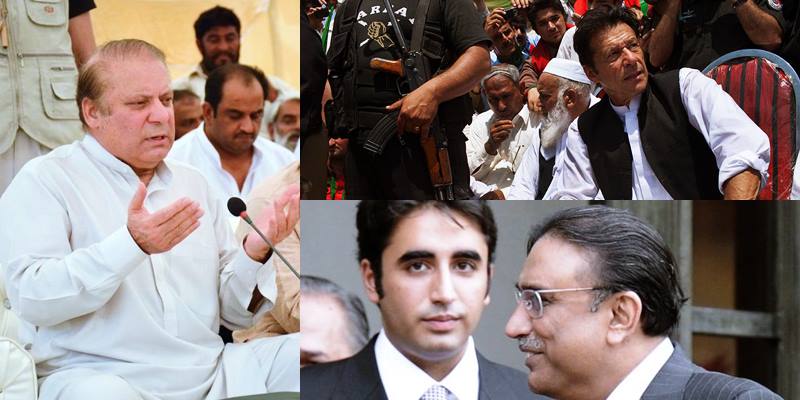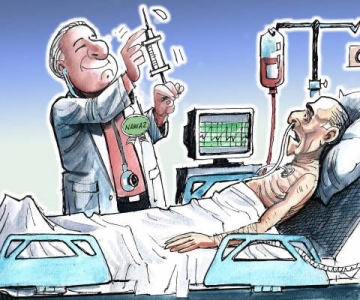My piece published here
Pakistan’s next general election, due in a few months, will be the first where civilian forces are in charge of the transition from one elected government to another. Throughout its history, Pakistan’s military and civil bureaucracy have been the arbiters of political transitions.
With the elections nearing, the political leadership of Pakistan faces many questions about not only the interim government that will oversee the polls, but also the rules of the game for those contesting elections.
While Pakistan’s noisy and multifarious media is highlighting various election issues, on most occasions the intent behind the programming is to sensatationalise matters. It is critical to inform the public about these issues and build sufficient pressure on institutions to take steps wherever necessary to ensure free, fair and transparent elections.
There are seven main challenges before the political parties, especially those leading the coalition government and the opposition. The sooner these are dealt with, the more likely that the coming elections will make history.
Caretaker governments
The current National Assembly term ends on March 16, yet the election schedule and the interim government have not been decided. Both are the focus of much speculation, political point-scoring and conspiracy theories. It is vital for the major political parties to agree on the caretaker prime minister and chief ministers.
Instead of bickering over individuals, the government and the opposition should tilt the balance of power in favour of the political forces rather than leaving such decisions to unelected institutions. If the ruling Pakistan Peoples Party and the Pakistan Muslim League-Nawaz fail to agree on the caretaker government, the Election Commission of Pakistan would have to take a decision. In any case, we need to develop healthy parliamentary traditions and a culture of bipartisan consensus on matters of national interest.
Given that there are political forces outside parliament, the government and opposition need to consult parties like the Pakistan Tehrik-e-Insaf which boycotted the 2008 elections. That consultation must be initiated immediately and concluded as soon as possible. If the politicians could agree on the 18th Amendment and other vital political compacts, then this should not be a difficult endeavour.
Compliance with the Election Commission scrutiny process
It would be counterproductive for the political parties to indulge in a confrontational game with the ECP. In fact, after the conclusion of a democratic tenure and public concerns over the quality of politicians who enter the legislatures, the political parties would be doing themselves a big favour by undertaking a clean-up process within their ranks.
Nominating candidates with dubious credentials hardly helps the image of the political parties and the future of democracy. Exaggerated or not, the perception that most parliamentarians don’t pay taxes or they are loan defaulters needs to be addressed by the parties themselves. Sections of media may be delegitimising the politicians, but the political parties must address these concerns instead of trying to sweep them under the carpet. This may be the best time to put in place internal screening mechanisms where the electoral strength of a candidate may be tested against his or her eligibility as per the ECP rules.
The third challenge pertains to intra-party mechanisms for adherence to the electoral code of conduct.
The parliamentarians have now amended the electoral code of conduct and formally accepted most of what the ECP had suggested. The code is ambitious, for it asks the political parties to avoid displaying weapons, regulate campaign expenditure, streamline the process of advertising through hoardings and billboards, and above all set out an overall framework for peaceful elections. The code is well conceived; however the real challenge is its enforcement.
The code of conduct cannot be implemented without the full ownership of the political parties and effective sensitisation measures within the party ranks whereby all candidates are made to adhere to it, and all violations are considered breaches of party discipline. The evidence of the parties’ willingness to undertake the required measures seems lacking thus far.
Shunning extremism
Perhaps the most disturbing political feature of our times is the kowtowing to militant outfits by political parties for electoral gains. Most notably, the PMLN has entered into local, unwritten agreements with the Ahle Sunnat wal Jamaat (ASWJ). Such an alliance may favour the PMLN in the short-term, but would have a high cost to Pakistani society overall.
In a democracy, all shades of political actors coexist with each other. However, when violence as a justified means to uphold a particular ideology or worldview is legitimised, the brutalisation of society cannot be arrested. By giving leeway to militant organisations, political parties, are setting dangerous precedents. This may lead to a long term undermining of constitutional democracy as radical groups do not recognise the Pakistani state or its constitution. There is no alternative to building public pressure on the political parties on this issue, and ensuring that the ECP checks such practices.
Access to polling booths
My recent interactions with the political parties have underlined one key concern: the number of polling booths is way too small to cater to a country of 200 million people. For instance, in Balochistan the dispersed polling booths are an immediate hurdle in the way of maximum electoral participation. Similarly, to increase women’s participation, polling booths have to be enhanced.
The paucity of polling booths also necessitates the transportation of voters to the place of polling. This leads to a situation where richer candidates gain an edge over those who cannot afford such major investments. There are thousands of government buildings available across Pakistan which could be used as polling booths and there is no reason why adequate planning cannot handle additional demand. The ECP has already assured Pakistanis that 25,000 new polling booths would be added, creating 90,000 booths in total.
Women’s participation
The reasons for the low level of participation by women in Pakistan are well known. There are certain areas of the country where women are discouraged from voting. We cannot afford to let half of the electorate face hurdles in participating in such an important exercise. The ECP must take to task the political parties and candidates working with conservative forces to deny women their right to vote.
Media responsibility
There are worrying aspects of the media’s attitude to the electoral process. First, the corporate and the commercial override the imperatives of sound editorial practices and ethics of journalism. In recent months, two controversial characters – businessman Malik Riaz and religious leader Tahir-ul-Qadri – have been receiving inordinate media coverage. Paid content is evident and media responsibility at best is tenuous.
These are dangerous trends, for electoral campaigns may be unnecessarily influenced by money, thereby putting into question the ‘fairness’ of the exercise. The two regulators – the ECP and the Pakistan Electronic Media Regulatory Authority – must devise an elaborate framework to balance the corporate concerns of media houses with the requirements for electoral transparency.
At several points since 1988, the superior judiciary – toeing the line of the military establishment – has interfered in the electoral process. For instance, in 1988 it declared General Zia-ul-Haq’s dismissal of the Junejo government illegal but did not restore the government and decreed that fresh elections should take place. In the same year, the rule that ID cards must be presented at polling stations disenfranchised millions of Pakistanis and worked against the PPP. Through the 1990s and even under General Musharraf, court decisions were a major hurdle to the conduct of fair elections. In 2013 we hope that the Supreme Court will undo the past trends and support a free and fair election. The court would be best advised to strengthen Pakistan’s fractured and endangered democracy. An independent judiciary can only function in a constitutional democracy.
The influence of the military and intelligence agencies is a different subject altogether and the fact that civilians have been minimising space for that interference is a major step forward. It would be in the interest of the military to allow a legitimate election to take place given that it finds itself threatened by terrorists inside the country and regional powers outside the country. Its battle for survival can only succeed when it has the support of elected representatives of the people of Pakistan.
The recent statement from the military that the security establishment favours on-time elections is a welcome move, and we hope that the bitter experiences of the 1990s will not be repeated by rogue elements within its fold.



